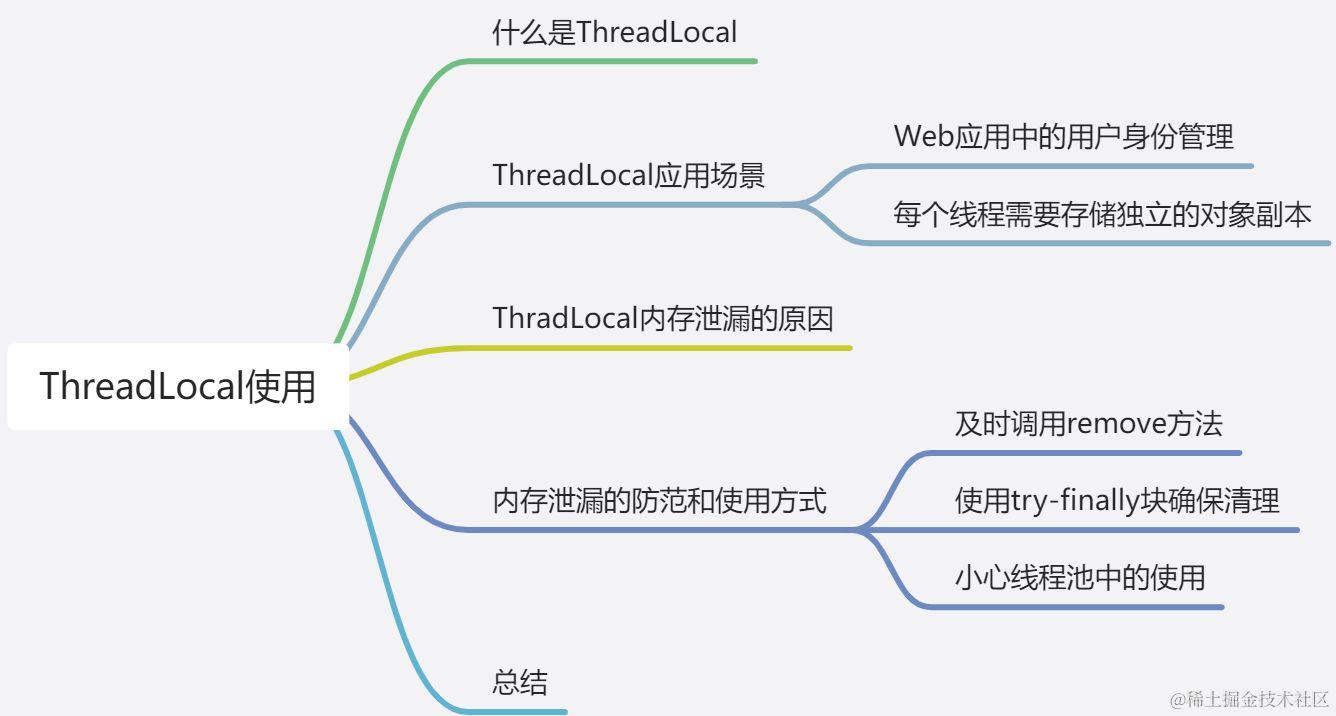
多线程编程中,数据共享与隔离一直是开发者需要面对的挑战之一。而Java中的ThreadLocal提供了一种优雅的解决方案,允许每个线程都拥有自己独立的数据副本,从而避免了共享数据带来的线程安全问题。然而,正如事物总有两面性一样,ThreadLocal也存在一些潜在的陷阱,尤其是与内存泄漏相关的问题。
什么是ThreadLocal?
在深入讨论ThreadLocal的内存泄漏问题之前,我们先来了解一下ThreadLocal的基本概念。ThreadLocal是Java中的一个工具类,提供了一种线程级别的数据隔离机制。通过ThreadLocal,我们可以在每个线程中存储自己的数据副本,互不影响,从而简化了多线程编程中的共享数据问题。
public class MyThreadLocal {private static final ThreadLocal<String> threadLocal = new ThreadLocal<>();public static void set(String value) {threadLocal.set(value);}public static String get() {return threadLocal.get();}
}
ThreadLocal应用场景
Web应用中的用户身份管理
在Web应用中,用户的身份信息是经常需要被访问的数据。使用ThreadLocal可以轻松地在用户登录后将用户信息存储在ThreadLocal中,这样在整个请求处理周期内都可以方便地获取到用户身份信息,而无需将用户信息作为参数传递到每个方法中。
public class UserContext {private static final ThreadLocal<User> userThreadLocal = new ThreadLocal<>();public static void setUser(User user) {userThreadLocal.set(user);}public static User getUser() {return userThreadLocal.get();}public static void clear() {userThreadLocal.remove();}
}
在用户登录时,可以通过UserContext.setUser(user) 将用户信息存储在ThreadLocal中。随后,在整个请求处理过程中,通过UserContext.getUser() 即可获取到用户信息,而无需一直传递User对象。
每个线程需要存储独立的对象副本
在我之前分享过的案例中,我使用了ThreadLocal来实现IP属地获取的功能,由于IP属地查询类(Searcher)需要在不同的线程中创建独立的对象,ThreadLocal提供了一种有效的解决方案。
原文链接:
利用Spring Boot实现客户端IP地理位置获取
private static final Logger log = LogManager.getLogger(IPUtils.class);private static final String DB_PATH = "/root/home_place/ip2region.xdb";private static final ThreadLocal<Searcher> searcherThreadLocal = ThreadLocal.withInitial(() -> {try {return Searcher.newWithFileOnly(DB_PATH);} catch (Exception e) {log.error("初始化 IP 归属地查询失败: {}", e.getMessage());return null;}});
ThreadLocal内存泄漏的原因
ThreadLocal可能导致内存泄漏的主要原因在于,ThreadLocal在线程结束后,如果没有手动调用remove方法清理ThreadLocal中的数据,这些数据将会一直存在于线程的ThreadLocalMap中,而不会被垃圾回收。这是因为ThreadLocalMap中的Entry (键值对)保留了对ThreadLocal实例的强引用,而ThreadLocal实例又引用着对应的值。即使线程结束了,ThreadLocalMap中的引用关系依然存在,阻碍了相关对象的垃圾回收。
ThreadLocal源码说明内存泄漏的原因:
/*** ThreadLocalMap is a customized hash map suitable only for* maintaining thread local values. No operations are exported* outside of the ThreadLocal class. The class is package private to* allow declaration of fields in class Thread. To help deal with* very large and long-lived usages, the hash table entries use* WeakReferences for keys. However, since reference queues are not* used, stale entries are guaranteed to be removed only when* the table starts running out of space.*/static class ThreadLocalMap {/*** The entries in this hash map extend WeakReference, using* its main ref field as the key (which is always a* ThreadLocal object). Note that null keys (i.e. entry.get()* == null) mean that the key is no longer referenced, so the* entry can be expunged from table. Such entries are referred to* as "stale entries" in the code that follows.*/static class Entry extends WeakReference<ThreadLocal<?>> {/** The value associated with this ThreadLocal. */Object value;Entry(ThreadLocal<?> k, Object v) {super(k);value = v;}}/*** The initial capacity -- MUST be a power of two.*/private static final int INITIAL_CAPACITY = 16;
/**
The entries in this hash map extend WeakReference, using
its main ref field as the key (which is always a
ThreadLocal object). Note that null keys (i.e. entry.get()
== null) mean that the key is no longer referenced, so the
entry can be expunged from table. Such entries are referred to
as “stale entries” in the code that follows.
*/
此哈希映射中的条目扩展 WeakReference,使用其主 ref 字段作为键(始终是 ThreadLocal 对象)。请注意,空键(即 entry.get() == null)意味着不再引用该键,因此可以从表中删除该条目。此类条目在下面的代码中称为“过时条目”。
内存泄漏的防范使用方式
为了避免ThreadLocal导致的内存泄漏问题,开发者应该养成良好的使用习惯:
及时调用remove方法
在使用ThreadLocal的过程中,务必在合适的时机调用remove方法,手动清理ThreadLocalMap中的Entry。这样可以防止ThreadLocal对象和值的强引用一直存在,有助于相关对象的垃圾回收。
public class MyThreadLocal {private static final ThreadLocal<String> threadLocal = new ThreadLocal<>();public static void set(String value) {threadLocal.set(value);}public static String get() {return threadLocal.get();}public static void clear() {threadLocal.remove();}
}
使用try-finally块确保清理
在某些情况下,使用try-finally块可以确保在发生异常时也能够调用remove方法,避免遗漏清理的情况。在使用线程池等场景时,特别注意ThreadLocal的生命周期,避免长时间存在的线程携带着无用的ThreadLocal数据。
public class MyThreadLocal {private static final ThreadLocal<String> threadLocal = new ThreadLocal<>();public static void set(String value) {threadLocal.set(value);}public static String get() {return threadLocal.get();}public static void main(String[] args) {try {set("value");// 在使用完之后立即调用remove方法} finally {clear();}}
}
小心线程池中的使用
在使用线程池等场景时,特别要注意ThreadLocal的生命周期。线程池中的线程可能会被重用,如果不及时清理ThreadLocal,前一个任务中的ThreadLocal数据就会泄漏到下一个任务中。
4. 总结
ThreadLocal是一个强大的工具,能够在多线程环境中解决共享数据的问题。然而,开发者在使用ThreadLocal时应当小心,特别是在长时间存在的线程和线程池等场景下,要注意及时清理ThreadLocal,以避免内存泄漏的发生。通过正确的使用习惯和最佳实践,可以更好地发挥ThreadLocal的优势,确保多线程环境下的数据安全和性能。
后续内容文章持续更新中…
近期发布。
关于我
👋🏻你好,我是Debug.c。微信公众号:种棵代码技术树 的维护者,一个跨专业自学Java,对技术保持热爱的bug猿,同样也是在某二线城市打拼四年余的Java Coder。
🏆在掘金、CSDN、公众号我将分享我最近学习的内容、踩过的坑以及自己对技术的理解。
📞如果您对我感兴趣,请联系我。
若有收获,就点个赞吧,喜欢原图请私信我。



)

)









)




